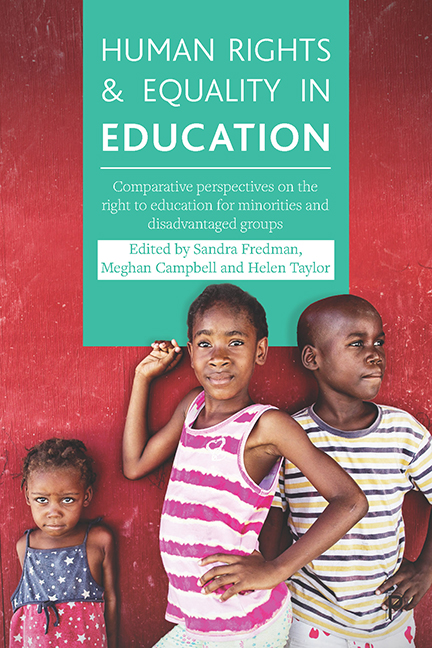 Human Rights and Equality in Education
Human Rights and Equality in Education Book contents
- Frontmatter
- Contents
- Notes on contributors
- Foreword
- Human rights and equality in education: Introduction
- Part I The role of public and private actors in education
- Part II Balancing the right to freedom of religion and culture and the right to education
- Part III Gender equality in education: moving beyond access to primary education
- Part IV Litigating for quality and equality in education
- Index
six - Women and education: the right to substantive equality
Published online by Cambridge University Press: 19 April 2022
- Frontmatter
- Contents
- Notes on contributors
- Foreword
- Human rights and equality in education: Introduction
- Part I The role of public and private actors in education
- Part II Balancing the right to freedom of religion and culture and the right to education
- Part III Gender equality in education: moving beyond access to primary education
- Part IV Litigating for quality and equality in education
- Index
Summary
Introduction
In September 2015, the world committed itself to ensure inclusive and equitable quality education and to promote lifelong learning opportunities for all by 2030. At the same time, it promised to achieve gender equality and empower all women and girls within the next 15 years. These ambitious proclamations came at the close of the 15-year period set by the Millennium Development Goals (MDGs) to achieve equality in primary education between boys and girls. Although the United Nations Development Program (UNDP) claims to have achieved that goal, a closer look reveals that there is still a long way to go. It is argued here that the notion of equality as parity, which has been used in measuring the achievements of the development goals, is too limited. Simply treating girls and boys equally will not address the gendered power relations which lead to ongoing inequality in education. Instead, it is argued that the principle of substantive equality should be the framework for evaluating progress towards equality in education. This requires attention to be paid to redressing disadvantage; addressing stigma, stereotyping, prejudice and violence; facilitating participation; and accommodating difference and achieving structural change.
Development goals and human rights
In 2015, the UNDP proudly proclaimed: ‘The world has achieved equality in primary education between girls and boys.’ Equality in primary education was one of the three targets set in 2000 to be achieved by 2015 as part of the third MDG goal of promoting gender equality and empowering women. However, a closer look at the statistics shows that in fact only 64% of countries in the developing regions had achieved gender parity by 2012. Nor do these statistics give a full picture. Statistics refer to enrolment rather than completion. In fact, the MDG 2015 report states that almost 100 million adolescents are still not completing primary school. More worrying still, there were 57 million out-of-school children of primary school age in 2015. Of these 55% were girls. Moreover, nearly half (48%) of out-of-school girls are unlikely ever to go to school compared to about 37% of out-of- school boys.
The Sustainable Development Goals (SDGs) agreed in 2015 are more ambitious. SDG4 commits the world to ensuring inclusive and equitable quality education and to promote lifelong learning opportunities for all by 2030.
- Type
- Chapter
- Information
- Human Rights and Equality in EducationComparative Perspectives on the Right to Education for Minorities and Disadvantaged Groups, pp. 99 - 110Publisher: Bristol University PressPrint publication year: 2018


